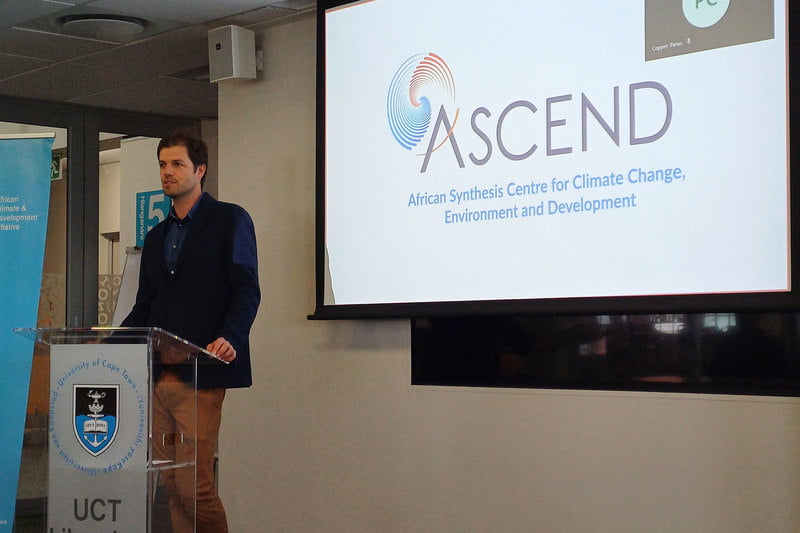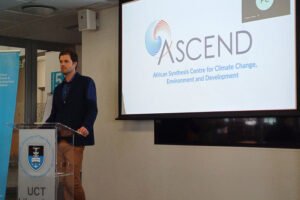The international launch of the African Synthesis Centre for Climate Change, Environment and Development (ASCEND) at the University of Cape Town (UCT) is set to accelerate the pace and nature of climate change action across Africa and globally.
Launched on 1 November, ASCEND will provide a specialised infrastructure for teams of researchers, policy-makers, and practitioners to harness and integrate diverse data and knowledge on climate change to accelerate discoveries and enhance equitable and effective action on climate change and development.
The new centre will be hosted at UCT’s African Climate and Development Initiative (ACDI) and represents a first for the continent. It is also the world’s first synthesis centre that focuses on climate change and development and will be underpinned by a strong focus on the Global South.
“The 2020s are a critical decade for climate action.”
In an era of rapid climate change, research knowledge and data on climate change impacts and solutions have burgeoned worldwide, said ASCEND director, Dr Christopher Trisos.
“We often think of sophisticated equipment like a radio telescope or a biotech laboratory as essential for scientific discovery, but in this age of complex social and environmental challenges –such as climate change – another form of research infrastructure is now essential too: synthesis centres.”
As a synthesis centre, ASCEND will provide a platform for transdisciplinary teams of policy-makers, researchers and practitioners to synthesise and leverage the wealth of existing data and knowledge for climate change solutions. The aim is to generate actionable research that will advance climate-resilient development, the core of which is the well-being of people and ecosystems.
“The 2020s are a critical decade for climate action,” Dr Trisos said at the launch, attended by high-level researchers, government representatives and funders from Africa and abroad.

“Decision-makers, practitioners, and researchers must address complex problems that cut across disciplines, geographies and socioeconomic divides to enable the transformative change necessary to secure a sustainable future for all.”
He added, “Climate change, biodiversity loss, and poverty are interlinked problems that cannot be solved by any single discipline. A lack of data and knowledge synthesis limits breakthrough research and decision-making.”
Accelerate African solutions
The centre will welcome synthesis teams in 2024, when work begins on the BAOBAB synthesis project for African research on climate change. This will bring together climate change data, researchers, and decision-makers from across the continent and nurture African scholars and scholarship.
Speaking at the launch, Deputy Vice-Chancellor for Research and Internationalisation Professor Sue Harrison said the development is timely in a data-rich, data-driven world.
“UCT is proud to be part of the initiative … We really need this kind of infrastructure; the collaborative teamwork spaces where we can get to grips with big data and diverse knowledge in a way that is demand driven and in a more equitable and deliberately designed teamwork environment.”
The importance of a centre based in Africa and the Global South allows us to talk very specifically to the needs of this part of our world.
Harrison added, “And the importance of a centre based in Africa and the Global South allows us to talk very specifically to the needs of this part of our world. Everything we talk about at UCT for our Vision 2030 regards how we make a real difference in this world. And actionable research is integral to this.”
The centre has been seven years in the making and was brought to fruition thanks to funding and support by a variety of international bodies, which recognised the strengths and cost efficiency of transdisciplinary teams.
ASCEND has been supported and funded by the Gabriel Foundation (which also contributed to the UCT Neuroscience Institute), co-founded by UCT alumnus David Barnes; as well as the Climate Adaptation & Resilience (CLARE) and Step Change projects of the United Kingdom International Development, the Netherlands Ministry of Foreign Affairs, and the IDRC-CRDI Canada.
BAOBAB synthesis project
Participants of ASCEND synthesis teams will consist of up to 15 members that will meet at the UCT-hosted base up to four times over two years, with work continuing between meetings.
BAOBAB will fund up to six African-led synthesis teams over the next three years and each team will have a postdoctoral research fellow based at UCT.
“ASCEND will only be as strong and effective as the teams we can attract and support at the centre.”
The leaders and other members of teams can be located anywhere in Africa, and they can be from policy, research or practitioner backgrounds.
Calls for teams on a particular theme will be advertised soon and notices of this will be posted on the ASCEND website and in their newsletter.
“ASCEND will only be as strong and effective as the teams we can attract and support at the centre,” said Trisos.
Sparking real change
The scale of need is massive, said South African scientist Professor Debra Roberts, a past co-chair of the Intergovernmental Panel on Climate Change (IPCC). Professor Roberts addressed launch participants online from the Netherlands.
“We live in a world that’s challenging and changing across multiple fronts, both economically and environmentally. And we need many different knowledge types to inform our responses. A synthesis centre is critical in making that possible … a resource that can spark real change.
“The centre at UCT is a critical investment in all of our futures.”
Dr Edmond Totin, an IPCC author and senior lecturer at Université Nationale d’Agriculture in Benin, said, “A synthesis centre provides an opportunity to develop more actionable solutions driven by the needs of policy-makers.”
Adding to that, Dr Aditi Mukherji, an IPCC author and the director of the Consortium of International Agricultural Research Centers Climate Impact Platform, said, “We have a vast amount of knowledge with a focus on what we can do to reduce impacts of climate change but what is still missing is the synthesis of information for the more granular solutions. In this decade of [climate] action our focus needs to be on actionable solutions and for that we really need this kind of synthesis.”
ASCEND’s five key aims:
- Strengthening research and knowledge brokering for climate change and development action.
- Fostering scientific discoveries that transform our understanding of interlinked climate change and development challenges and uncover solutions.
- Improving analysis and training to synthesise diverse existing data and knowledge for solution-oriented research.
- Leadership of actionable research by African and Global South researchers, decision-makers, and practitioners.
- Promoting a focus on equity and justice in climate change and development research and action.
Article source – https://www.news.uct.ac.za/article/-2023-11-09-first-climate-change-synthesis-centre-for-africa-launched-hosted-at-uct

